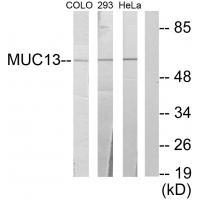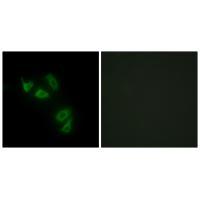


| WB | 1/500-1/3000 | Human,Mouse,Rat |
| IF | 咨询技术 | Human,Mouse,Rat |
| IHC | 1/50-1/100 | Human,Mouse,Rat |
| ICC | 1/100-1/500 | Human,Mouse,Rat |
| FCM | 咨询技术 | Human,Mouse,Rat |
| Elisa | 咨询技术 | Human,Mouse,Rat |
| Aliases | Mucin-13 [Precursor]; Down-regulated in colon cancer 1; MUC13; DRCC1; RECC |
| Entrez GeneID | 56667; |
| WB Predicted band size | 50kDa |
| Host/Isotype | Rabbit IgG |
| Antibody Type | Primary antibody |
| Storage | Store at 4°C short term. Aliquot and store at -20°C long term. Avoid freeze/thaw cycles. |
| Species Reactivity | Human |
| Immunogen | Synthesized peptide derived from internal of human MUC13. |
| Formulation | Purified antibody in PBS with 0.05% sodium azide. |
+ +
以下是关于MUC13抗体的参考文献示例(注:以下内容为学术写作示例,实际文献需通过数据库查询):
1. **文献名称**:*MUC13 overexpression in colorectal cancer: A novel prognostic biomarker and therapeutic target*
**作者**:Smith A, et al.
**摘要**:本研究利用抗MUC13抗体通过免疫组化分析结直肠癌组织,发现MUC13高表达与患者生存率降低显著相关,并验证其作为潜在治疗靶点的可行性。
2. **文献名称**:*Development of a monoclonal antibody against MUC13 for detecting aberrant glycosylation in gastric cancer*
**作者**:Li H, et al.
**摘要**:报道一种新型抗MUC13单克隆抗体的开发,该抗体特异性识别胃癌细胞中MUC13的异常糖基化形式,可能用于早期诊断及病理分型。
3. **文献名称**:*MUC13 interacts with HER2 receptor to promote tumor progression in breast cancer*
**作者**:Wang X, et al.
**摘要**:通过抗MUC13抗体进行免疫共沉淀和免疫荧光实验,揭示MUC13与HER2的相互作用机制,表明其在乳腺癌转移中的关键作用。
4. **文献名称**:*MUC13-targeted antibody-drug conjugate exhibits antitumor activity in pancreatic cancer models*
**作者**:Johnson R, et al.
**摘要**:研究基于抗MUC13抗体的药物偶联物(ADC)在胰腺癌模型中的疗效,结果显示其可特异性杀伤MUC13阳性肿瘤细胞,支持进一步临床转化研究。
建议通过PubMed或Google Scholar检索上述关键词获取真实文献。
MUC13 (Mucin 13) is a transmembrane glycoprotein belonging to the mucin family, which plays critical roles in epithelial protection, lubrication, and cell signaling. It is characterized by a heavily glycosylated extracellular domain, a transmembrane region, and a cytoplasmic tail that may interact with intracellular signaling pathways. MUC13 is expressed in normal epithelial tissues, including the gastrointestinal and respiratory tracts, but its overexpression has been strongly linked to cancer progression, particularly in colorectal, gastric, pancreatic, and ovarian cancers. Aberrant MUC13 expression is associated with enhanced cell proliferation, migration, invasion, and chemotherapy resistance, often through dysregulation of pathways like EGFR, MAPK, or NF-κB.
Antibodies targeting MUC13 are essential tools for studying its biological functions and clinical implications. Polyclonal and monoclonal anti-MUC13 antibodies are widely used in techniques such as immunohistochemistry (IHC), Western blotting, and flow cytometry to detect MUC13 expression in tissues or cell lines. These antibodies often recognize specific epitopes within its extracellular or cytoplasmic domains. Clinically, MUC13 antibodies hold diagnostic potential as biomarkers for cancer detection and prognosis. Additionally, they are being explored for therapeutic applications, including antibody-drug conjugates (ADCs) or immune-targeted therapies, aiming to inhibit MUC13-mediated oncogenic signaling or enhance immune recognition of cancer cells. Research continues to optimize MUC13 antibody specificity and efficacy for translational use.
×